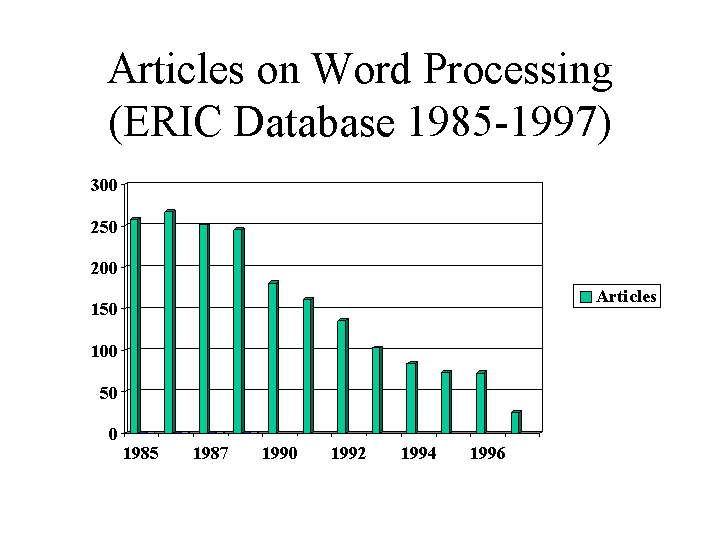Green Squiggly Lines:
Historical Contexts
Examining the effects of computer technologies on writing assessment against the backdrop of the social turn in composition studies and the move toward portfolio assessment demonstrates a growing division between micro- and macro-levels of reading, responding and evaluating. Bernard Susser (1998) notes a parallel development in the shift of the "focus" of the computers and writing (C&W) field around 1989 "from word processing to computer-mediated communication (CMC), hypertext, and other innovative forms of writing technology" (p.348). His claim is supported by the decline in articles about word processing listed in the ERIC database from 1985-1997: "1985, 258 items; 1987, 251; 1988, 210; 1989, 245; 1990, 181; 1991, 161; 1992, 136; 1993, 103; 1994, 84; 1995, 74; 1996, 73; and 1997, 25" (p. 348).

Despite this marked decline in the study of word processing by educational researchers, Susser's thesis is not that word processing dissappeared but rather that it "never appeared in any meaningful sense" (p. 349). According to Susser, "researchers have for the most part ignored the important variable of the level of their participants' skills with word-processing packages" (p. 355). In other words, research has focused on students' general development as writers without examining their interactions with the word processing software (pp. 350-355).
The move toward portfolio
assessment, especially electronic portfolios, has in some ways contributed to
this shift away from a micro-level of reading, responding to and evaluating
student work in favor of a larger, global collection of student work and demonstrations
of progress over time. During the 1990s, Kristine Blair and Pamela Takayoshi
(1997), M. A. Syverson (2000), and the writing programs at Alverno
College (2000) and Kalamazoo College
(2000) used electronic portfolios to push toward authentic,
communication-based forms of writing assessment. This work in electronic
portfolios continued the tradition of excluding an explicit discussion of word
processing software's influence on students' composing processes-on the intimate,
sentence-level of students' language. If we pause for a moment to think about
Microsoft Word's green squiggly lines, we realize that in 2002, software-based
feedback agents are always already intervening in students' composing processes.